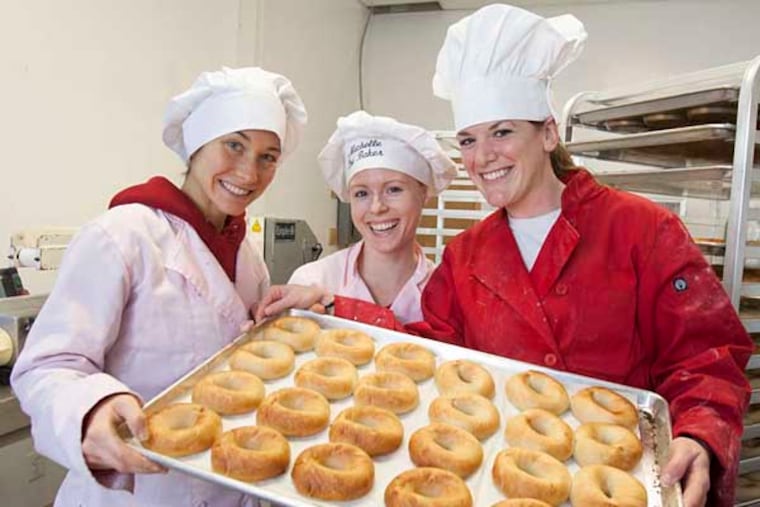The incredible secret gluten-free bagel - in Manayunk
To visit the Sweet Note Bagels bakery, a spare, 600-square-foot manufacturing space within the old Le Bus headquarters in Manayunk, you'll have to sign a nondisclosure form, or, at least, pledge not to reveal any trade secrets.

To visit the Sweet Note Bagels bakery, a spare, 600-square-foot manufacturing space within the old Le Bus headquarters in Manayunk, you'll have to sign a nondisclosure form, or, at least, pledge not to reveal any trade secrets.
After all, a good gluten-free bagel is hard to find, and even harder to make. And Sweet Note founder Michelle MacDonald, 28, has learned from experience that plenty of people would like to get their hands on her patent-pending process.
Her company, which is 15 months old and run by three women under 30, is selling 5,000 bagels a week, serving 70 restaurants and shops in five states. Recently, Sweet Note put its bagels to the toughest test yet: It began selling in New York.
"A lot of our customers say, 'This is a real, New York-style bagel - and I don't know how you did it because you're from Philly,' " MacDonald said.
Not to mention the far greater barrier she had to overcome: She's making the bagels without a trace of wheat, instead using rice, tapioca, and sorghum flours, among other nontraditional ingredients.
MacDonald began developing the bagel after her grandfather, diagnosed with celiac disease in 2009, bemoaned the loss of his favorite nosh. Having gone to college in the Midwest, she could relate.
"I remember . . . how terrible the bagels were out there, these soft pieces of bread with a hole in the middle. It's not a bagel to me," she said. "I tested every gluten-free bagel on the market, and they were all ... fluffy, not a good, dense, crusty bagel."
MacDonald, who had always harbored entrepreneurial dreams and a love of baking, saw a market opportunity.
But first, she'd have to create a decent bagel. Gluten-free baking is still an emerging science, so it required a lot of trial, and even more error.
"It was like, 'Let me try this chickpea flour because I hear that's good sometimes,' " MacDonald said, "and then I had a bagel that tasted like beans."
She tried almond flour, but worried about people with nut allergies. She ruled out dairy because lactose and gluten intolerances can go hand in hand. She tried boiling the bagels, the traditional way, but the result was rubbery. She sought advice from the American Egg Board, and the Culinary Institute of America.
Fifteen recipes and three months later, she hit on a winning formula: The bagel was dense and chewy, with a glossy, golden crust. She took it to West Philly's Green Line Cafe, which put in an order - for three bagels a day.
It was a meager start, but that order soon ballooned to four cases per week. Green Line kitchen manager Jennifer Satinsky said there had been steady demand for the offering. "When we first started, we had some people that were just so thankful that we had them."
More cafes followed: Clients include coffee shops like Saxby's, groceries like the Shop n Bag in Dresher, and bagel stores like South Street Philly Bagels. Soon, MacDonald couldn't roll bagels fast enough.
She tried contracting with a manufacturer, or co-packer, to produce the bagels.
But there was a problem, she said: "The bagels just weren't the same. I thought, 'Could I be the secret ingredient? I don't know if I want to be.' "
Instead, she hired Brittany Nettles, a healthy-living blogger, to help out. Nettles, 19, is now president of sales and marketing, and a business and marketing student at Holy Family University.
Soon, they moved from hand-rolling the bagels to using a customized machine that can shape thousands of bagels per day.
By November, they'd outgrown their work space in a borrowed restaurant kitchen and moved to Manayunk. That facility, with a large walk-in freezer, has raised the stakes.
"Before, our goal was to produce 48 cases of bagels," Nettles said. That was the capacity of the restaurant's freezer, 1,720 bagels' worth. "Now, our goal is to fill this with 10 pallets, empty it, and refill it." That'd be 20,000 bagels. After spending $16,000 on new equipment and hiring a third baker, Alison Vandermay, 25, the company is breaking even. MacDonald hopes to be profitable within a few months.
It's not far-fetched, given the growing interest in gluten-free dining, as a result of increased awareness of celiac disease and gluten intolerance and by the best-selling anti-wheat treatises like cardiologist William Davis' Wheat Belly, and neurologist David Perlmutter's Grain Brain.
A 2013 survey by the NPD Group found 30 percent of U.S. adults were trying to cut back on gluten.
Nettles said more restaurateurs were taking notice, even if she does have to explain the gluten-free diet and teach them to avoid cross-contamination. "It's a lot of education," she said.
In the process, both women educated themselves - and adopted gluten-free diets. MacDonald suspects she has celiac; her sister was diagnosed recently. But she feels better and has more energy, and that's enough. She'll need that extra energy as she looks to expand Sweet Note's shipping area and add products, like bagel chips.
They're also seeking other gluten-free businesses to partner with them in distribution. But after one such partnership fell apart - the company in question launched a bagel of its own instead - they're proceeding with caution.
MacDonald said she had learned that's just part of being an entrepreneur.
"I look at it like: That must mean we've got a really good idea."
215-854-5053
@samanthamelamed